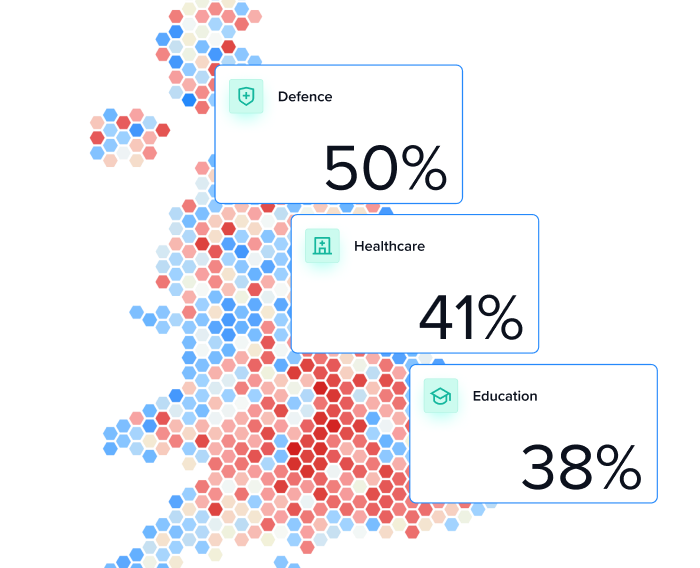Blog/Polling
Election interviews in swing states find a restless and divided American public
The upcoming US presidential election could be decided by just a few thousand voters in swing states. We have checked in with 100 of them over the course of two days using our Focaldata AI qualitative platform to find out their views on the country, the world, and the upcoming election.
We have sought to show as much of the raw data as possible, giving you an insight into voters’ views in their own words without too much editorialising. Over half of our panellists are quoted directly at some point in this write-up.
An unhappy electorate
The coming election will take place among a fractious and unhappy electorate, frustrated by the state of the country and growing political divisions. A majority of our respondents think that the country is going in the wrong direction, with the economy, cost of living, political polarisation and a perceived lack of leadership key themes in our research.
Many respondents link political polarisation directly to their perception of the country’s decline. One respondent, Raquel, a 55-year-old software lead from Minnesota who did not vote at the last election, opined that ‘we’ve gotten so polarised that we have lost sight of what’s best for our country.’

Voter pessimism is not contained within the borders of the United States, though. Many of the voters we spoke to see the world as an increasingly dangerous place, with major concerns over global wars, climate change and overall instability and their impact domestically. Some voters see the global chaos as a reason for isolationism, while others sing the virtues of diplomacy and oppose a turn to individualism.

The economy takes centre stage
In terms of the biggest domestic issues, the economy takes centre stage, with almost half of respondents highlighting it as a major political problem. Respondents mentioned inflation and the increased cost of living, with gas prices and groceries in particular standing out. The political campaigns may be wise to focus on these two economic emblems over the next few months.
Many voters blame Joe Biden in particular for the economic situation. Gene, a 70-year-old retiree from Florida who voted for Trump in 2020, claimed that ‘the only way to curb inflation is to get Trump into office.’
The issue cuts across partisan lines, however. Crucially, the cost of living was not just seen as a problem facing the poorest Americans, with many respondents indicating that the average American has it tough, pointing towards the cost of living being a battleground issue among key swing voters in November.
Cultural topics like immigration, crime and abortion were also raised by many in our focus group. Around a quarter of respondents raised immigration as a major issue. Abortion was a particularly contentious topic, with respondents split on the issue and often very passionate.

Trump and Harris divide opinion
When we turned to the presidential candidates, we found that Donald Trump remains a highly-polarising figure among the electorate. Trump’s America First message has real cut-through among his supporters, but his adoration in some quarters is at least matched by the repulsion from others. Pro-Trump respondents frequently mentioned ‘putting the American people first’, while anti-Trumpers blame him for the country's division. Sam, a 30-year-old accountant from Michigan, said ‘we are in such a divide now due to his rhetoric.’

Numerous respondents were concerned about the potential impact of another Trump presidency and see the former president as a destructive force in American politics.

While views of Kamala Harris are generally not as strong in either direction, political polarisation does not exempt the Democrats, with voters divided on their attitudes to the presumptive Democratic nominee. Many positive views on Harris stem from an opposition to Trump.

Abortion and anti-Trump voting key to Harris support
As discussion turned to the election in November, Trump’s record on the economy was given as a key factor for many people’s support, and the former president even received praise from those who did not vote for him in 2020. Multiple voters expressed a desire to go back to the era of Trump’s presidency, which they viewed as safer, with higher economic standards. Steven, a 32-year-old unemployed man from Georgia, suggested that ‘[Trump is] the closest we got to peace and things being affordable.’
Generally speaking, Harris voters were not hugely enthusiastic about the presumptive Democratic nominee, but expressed a strong desire to keep Trump out and protect abortion rights.

Based on our findings, it looks like the election may be a fight for attention between a Trump campaign that wants to focus on bread-and-butter issues like the economy, and a Harris campaign seeking to highlight broader structural themes like the future of democracy and the role of government and the Supreme Court. Over the next few months, the views of these 100 voters could be crucial to determining the next president.
We will check in with another group of voters in the coming weeks.
Methodological note
This project was conducted using our Focaldata AI platform, which allows us to conduct deep individual-level qualitative research on a large scale, avoiding the groupthink risks of traditional focus groups and providing speedy results without sacrificing data quality. Our AI co-worker supports every aspect of research, from planning and moderation to analysis and presentation.
Names and profile pictures in this study have been anonymised, but all quotes and demographic information are real, with ages randomised to within two years of each respondent's real age.
We gathered a sample of 100 US adults in the 10 closest swing states across the last two presidential elections: Arizona, Florida, Georgia, Michigan, Minnesota, Nevada, New Hampshire, North Carolina, Pennsylvania and Wisconsin. Some voted for Joe Biden in 2020, some voted for Donald Trump, and others voted for third parties or did not vote.
If you're interested in using Focaldata AI to conduct qualitative research, we'd love to hear from you. For a personalised consultation and demo, email us at contact@focaldata.com.


